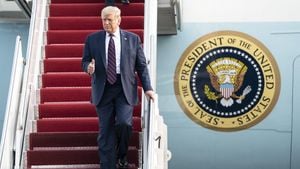On December 3, 2024, South Korea found itself plunged again toward political upheaval as President Yoon Suk Yeol declared martial law, a shocking move intended to quell dissent and protest against his administration. This declaration caught many off guard, coming amid accusations of corruption and ineffective governance during Yoon's tenure. The martial law, which prohibited political gatherings and severely restricted free expression, echoed dark historical moments fraught with turmoil and oppression, inciting public outrage and fears of autocracy.
The atmosphere was tense as news of the martial law spread across the nation, prompting immediate reactions from various civic organizations and ordinary citizens alike. Protesters crowded outside the National Assembly, waving banners demanding Yoon's impeachment, their voices unified against what many saw as overreach and abuse of power. A specter of anxiety loomed large; citizens recalled past struggles against similar forms of tyranny and were determined to prevent history from repeating itself.
Despite the declaration, the resilience of South Korea's democratic institutions shone through. Hours after the announcement, members of Parliament defied military pressure and convened to nullify the martial law. This decisive action stood as a stark reminder of the sacrifices made during South Korea's long fight for democracy, particularly recalling the 1980 Gwangju Massacre, where military rule brutally suppressed civilian protests, resulting in many deaths.
During this crisis, it became evident how far the nation had come and how fragile democracy can be. Citizens flooded the streets, emotions flaring as they rallied back against the president. The protests showcased the depth of public dissatisfaction, stemming not solely from Yoon's martial law declaration but also from broader discontent with his administration's policies, perceived corruption, and inability to address pressing societal issues.
The swift response from Parliament reflected the collective memory ingrained within the public, who were unwilling to back down under authoritarian threats. It was reminiscent of the 1980s when South Korea was embroiled in struggle for democracy, making those on the frontlines of the recent protests increasingly aware of the responsibility they bore. Political scientists and historians watched with vested interest, often remarking on how the dynamics of power were suddenly mirrored past experiences with angry recollections of government-led violence.
According to Chris Hahm, professor at Boston University and observer of the political climate, the declaration of martial law was reminiscent of warning signals against authoritarianism. He noted the fragility of democratic institutions worldwide and urged vigilance, stating, "Democracy is never guaranteed; it requires vigilance and active participation from its citizens." His reflections, grounded deeply in the recent events, emphasized the collective responsibility of society to protect their freedoms. He drew parallels between South Korea’s situation and potential threats to democracy observed globally, including threats posed by allegiance to leaders who may prioritize loyalty over accountability.
Meanwhile, Yoon's administration faced mounting pressure as lawmakers prepared for the second impeachment vote only days after the martial law was overturned. The developments since the declaration underscored the urgency surrounding Yoon’s leadership. With public trust eroding rapidly, the prospect of impeachment loomed large, pushing the president to reconsider his strategies and demands for accountability from his fragmented cabinet. Notably, this high-stakes political game unfolded at a time when governments worldwide were grappling with their challenges of governance, public trust, and societal division.
Following the abortive martial law, citizens rallied together across the political spectrum to show their commitment to democratic principles. Despite varying positions on governance and policy matters, one sentiment remained clear—there would be no tolerance for the suppression of free speech and political dissent. Protests morphed from mere expressions of discontent to fervent displays of civic unity emphasizing democratic rights.
The future of Yoon’s presidency now hangs precariously as legislators gear up to vote. Analysts suggest the outcome of this impending vote may not just determine the fate of Yoon but may also set the stage for South Korea's broader political transformation. Emphasizing civic engagement may forge pathways toward stability, but it also risks inviting heavier scrutiny of all political players involved.
Growing evidence of civic engagement—from the heated rallies to Parliament’s bold action—suggests citizens are unwilling to allow their hard-won freedoms to slip away without resistance. For many, this moment serves as both inspiration and caution; it brings forward questions, not only about the preservation of democracy but also about the nature of power and the responsibilities borne by leaders toward their constituents.
Should Yoon’s second impeachment vote pass, South Korea may witness its political terrain shift significantly, as political factions rally differently around the idea of leadership representation and accountability. What remains true is the power of collective citizen action remains undeniable, and that's perhaps the most hopeful message to emerge from this political maelstrom.
With future events uncertain, South Korea stands as a beacon of hope for democracy, reminding the world of the cost of complacency and the eternal need for vigilance. Just as the citizens of South Korea once fought against dictatorial rule, they now carry with them the spirit of perseverance united against the tides of oppression. Yoon’s presidential legacy hangs by a thread, resting upon the choices of both lawmakers and the will of the citizens, demonstrating democracy is, after all, shaped by the active involvement of its people.



